Investing in Refugees: How Africa Can Turn Forced Displacement into Opportunity
A new AfDB–UNHCR report urges Africa to shift from short-term humanitarian aid to long-term development investments that empower refugees and host communities alike. It argues that by treating displacement as a development opportunity, the continent can drive inclusive growth, resilience, and regional stability.

Africa is home to nearly one-third of the world's displaced people, and the numbers are rising as conflict, poverty, and climate disasters uproot millions. A new report, "Investing in Development Responses to Forced Displacement in Africa," jointly produced by the African Development Bank (AfDB) and the United Nations Refugee Agency (UNHCR) with support from the African Centre for Economic Transformation (ACET) and UNU-WIDER, argues that the continent must move from crisis response to opportunity creation. Released in September 2025, the report calls for a bold shift, from humanitarian aid to long-term investment in jobs, infrastructure, and social inclusion for both refugees and host communities.
A Shift from Relief to Resilience
For decades, African countries hosting refugees have depended on short-term humanitarian assistance. The report acknowledges that while such aid saves lives, it rarely rebuilds them. Instead, it calls for development-driven responses that unlock the economic potential of displaced populations. Refugees, it says, should be seen not as dependents but as contributors to growth. When given access to markets, education, and credit, they can create jobs, pay taxes, and strengthen local economies.
This approach aligns with the Global Compact on Refugees and the Sustainable Development Goals, especially those targeting poverty reduction and employment. The AfDB–UNHCR partnership blends financial investment with social inclusion, combining AfDB's development expertise with UNHCR's protection mandate to design solutions that last beyond emergencies.
Transforming Refugee-Hosting Regions
Across the continent, joint projects are already showing results. In Uganda, which allows refugees to work and move freely, AfDB-supported water and sanitation systems have improved life in settlements like Bidi Bidi and Nakivale, while also serving residents. In Kenya, the Kalobeyei Integrated Settlement has evolved from a traditional refugee camp into a vibrant town where refugees and locals share schools, markets, and solar power. In Chad, Ethiopia, and the Democratic Republic of Congo, new investments in health care, agriculture, and small enterprises are fostering self-reliance and stability.
According to AfDB projections cited in the report, every dollar invested in refugee-hosting areas generates up to $1.50 in local economic activity. This multiplier effect illustrates that development in displacement zones benefits entire regions, improving infrastructure, stimulating trade, and reducing tensions between hosts and refugees.
Empowering Women and Youth
The report highlights the crucial role of women and young people in driving economic resilience. Displaced women, it notes, are often community anchors but face major barriers to credit and education. Initiatives that support women-led cooperatives, vocational training, and micro-enterprises are already showing impact. In Chad, for instance, refugee women are using microloans to launch food-processing and agribusiness ventures that supply local markets.
Meanwhile, youth-focused programs are helping displaced young people acquire practical skills in renewable energy, construction, and digital services. These opportunities not only provide income but also prevent marginalization and promote social cohesion. By empowering women and youth, the AfDB–UNHCR partnership aims to turn humanitarian dependency into community leadership.
Facing the Climate–Displacement Connection
One of the report's strongest messages is that climate change and displacement are now inseparable. Droughts, floods, and environmental degradation are driving more people from their homes each year, especially in the Sahel and Horn of Africa. The report urges governments and donors to invest in climate-smart projects that both reduce vulnerability and create jobs.
Examples include reforestation programs, renewable energy grids, and sustainable irrigation systems in refugee-hosting regions. These projects, supported under AfDB's Climate Action Plan (2021–2030) and UNHCR's Climate Resilience Framework, show how environmental sustainability can align with economic inclusion. A map featured in the report vividly connects areas of environmental stress with zones of mass displacement, underscoring the urgency of integrated action.
Investing in Africa's Shared Future
To scale up impact, the report outlines clear policy recommendations. It calls on African governments to embed displacement into national development and budget frameworks, ensuring that host areas receive their fair share of resources. It also urges stronger data systems to measure progress and better coordination among donors, civil society, and the private sector. Financing tools like AfDB's Transition Support Facility and Africa Resilience Strategy are key to mobilizing both concessional and private investment.
The report's conclusion is clear: investing in refugees is investing in Africa's future. Displacement, if managed with foresight, can become a catalyst for growth, innovation, and regional stability. By viewing refugees and host communities as partners in development, Africa can replace dependency with self-reliance and turn one of its greatest challenges into a story of shared resilience and progress.
- FIRST PUBLISHED IN:
- Devdiscourse
ALSO READ
-
AfDB Approves $75M to Power Titanium Value-Addition Project in South Africa
-
AfDB Reviews East Africa Integration Strategy to Boost Regional Growth
-
AfDB Approves €117 Million to Boost Local Economic Development in Benin
-
AfDB Debars Chinese Firm for Fraud in Zambia Hydropower Project Tender
-
AfDB Approves US $8.6M Grant to Strengthen Water, Sanitation & Climate Resilience in Rural Burundi








